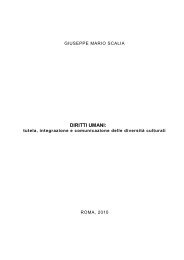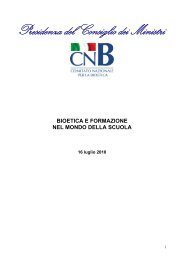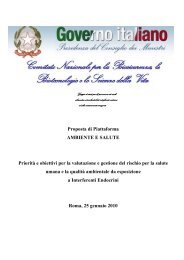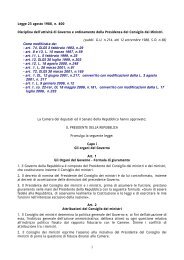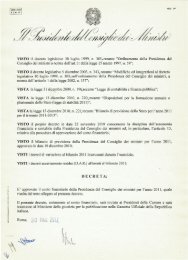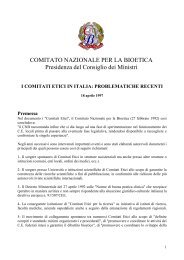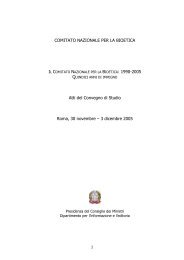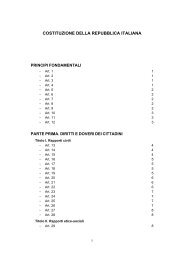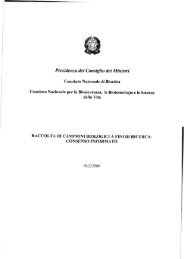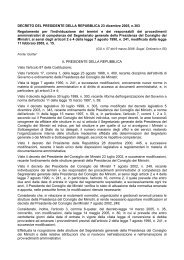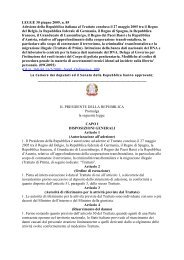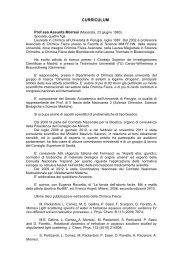President
President
President
You also want an ePaper? Increase the reach of your titles
YUMPU automatically turns print PDFs into web optimized ePapers that Google loves.
CRITERIA FOR ASCERTAINING DEATH<br />
1. Premise: previous NBC opinion “Definition and detection of human<br />
death” (1991)<br />
The National Bioethics Committee, with the opinion Definition and<br />
detection of human death (1991) already tackled the issue of ascertaining<br />
death on the basis of the neurological criteria 176 , for a long time considered in<br />
many countries as a valid criteria, together with the traditional one (cardiorespiratory).<br />
The document’s conclusion is that, already formulated by the Harvard<br />
Commission (1968) and the <strong>President</strong>’s Commission for the Study of Ethical<br />
Problems in Medicine and Biomedical and Behavioural Research (1980), of the<br />
concept of death defined as “total and irreversible loss of the organism’s ability<br />
to autonomously maintain its own functional unit”. It follows that in order to<br />
declare an individual “dead”, the Committee believes that it is clinically and<br />
ethically acceptable only the so-called whole brain death criterion “intended as<br />
an organic, irreparable brain damage, developed to an acute stage, which has<br />
caused a state of irreversible coma, where artificial life support has happened<br />
in time to prevent or treat an anoxic cardiac arrest” 177 .<br />
Therefore, with regards to the problem of ascertaining human death, the<br />
NBC accepts, like all western countries even before the 1990s, whole brain<br />
death as an additional criterion of death, with all the legal consequences that<br />
this implies (interruption of medical treatments, declarations of death, possibility<br />
of removing organs, burying the body, succession, etc.).<br />
The NBC’s document at the time proved to be of great importance to the<br />
Italian legislators, who, in the Law 578/93 Regulations to ascertain and certify<br />
death, took it largely into account, establishing in Art. 1 that “Death is identified<br />
with the irreversible cessation of all encephalic functions”.<br />
However, we can see how the NBC tackled this issue without discussing<br />
the bioethical debate already present in the 1990s, which on the one hand saw<br />
the definition of death as a philosophical and moral problem (What is death?<br />
What is the meaning and dignity of human life in the condition of absence of<br />
conscience and serious cerebral lesion?) and on the other hand doubted the<br />
notion of brain death. In addition, the interaction between the different<br />
conceptual levels seems fully expressed in the cultural debate and in the many<br />
critical contributions of these last twenty years, after the Committee’s<br />
document.<br />
This statement deserves further clarifications.<br />
The Committee’s main interest – following the debate that for various<br />
reasons was already going on in society at the time – was to make the reader<br />
understand the profound distinction that in “real” terms (that is, in the clinical<br />
events at the basis of the bioethical evaluation of human death) exists between<br />
the expression “brain death” and “whole brain death”, not always used correctly<br />
in the philosophical debate and source of great misunderstanding, at least<br />
potentially, in the behaviour of the doctors resuscitating an individual.<br />
176<br />
For an explanation and the meaning of the different terms used to refer to the issue of “brain<br />
death” see ultra “Glossary”.<br />
177<br />
National Bioethics Committee, Definition and detection of human death, 1991, p. 7.<br />
155



